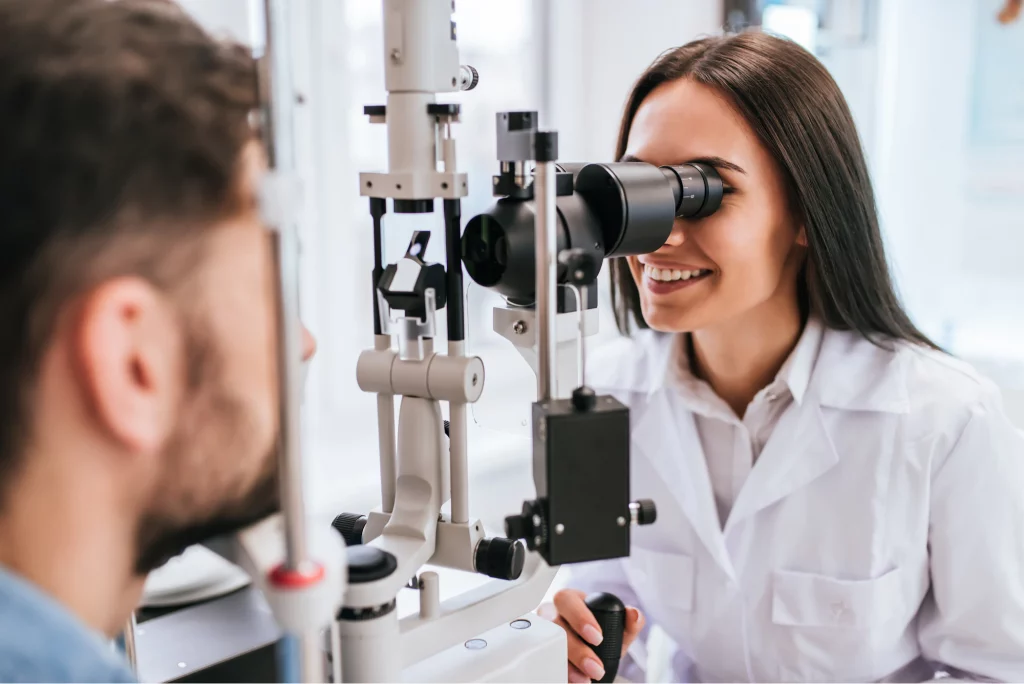Medically Reviewed by: Edward C. Wade, M.D., F.A.C.S.
When To See an Eye Doctor
Discerning when to see an eye doctor without the help of a doctor’s recommendation can be complicated. Most people go to the eye doctor when their doctor deems it necessary, or they don’t go at all until an emergency appears. You should know that visiting an eye doctor for routine check-ups is an essential part of caring for your eyes, and there are many reasons for a checkup other than eye infections or worsening vision.
What if I don’t have an eye doctor? Do I even need to see one? What is the difference between an optometrist and an ophthalmologist? We will answer these questions and more in this handy guide that will help you decide why and when to see an eye doctor.
Please note that the doctors at Eye Center of Texas do not perform routine eye examinations. We encourage our patients to visit our partner Optometrists, available on our recommended optometrists page.
Signs you should get your eyes checked
Do I need to see an eye doctor? Well, it depends. Ultimately you know your eyes best, outside of routine exams, here are a handful of circumstances that should put visiting the eye doctor at the top of your list:
Damage, debris, foreign objects in eyes
Essentially, debris and foreign objects in your eyes manifest in somewhat benign ways but can lead to a variety of serious eye problems including infection or a scratched cornea. Red, dry eyes often act as a symptom of infections, so it’s smart to schedule an appointment with your eye doctor to have it looked at. If you got something foreign in your eyes, you may also have eye damage that needs to be addressed.
Pain or fatigue
Eye pain over any sustained period is often your eyes telling you that something is wrong. This can appear in the form of light sensitivity, eye strain, or prolonged headaches. As tempting as it may be to try to simply ignore the pain, it’s smart to schedule an appointment with your eye doctor just in case there is a more serious condition behind the symptom. For example, eye pressure can be a sign of glaucoma or high blood pressure, dry eyes increase the risk of sustaining a scratched cornea, and an uptick in floaters can signify a detached retina.
Blurry vision
Blurry vision and double vision are both reasons that you should see an eye doctor. Blurry vision can simply signify that your eyes are changing (in which case you would want to go to the eye doctor anyway), but it can also be predictive of serious health and vision problems. There are two types of double vision, monocular and binocular, that can be caused by a number of things like abnormalities on any part of the eye, astigmatism, or misalignment — all of which should send you straight to your eye doctor.
Continue reading: Why is my vision blurry?
How often should I see an eye doctor?
Should you go to the doctor if you have perfect vision? Yes! Especially if you want it to stay that way. Vision health is a marathon, not a sprint, and everyday things like eye strain from phone use can greatly increase your risk of developing vision problems.
People aren’t often able to notice changes in their vision and are surprised when a doctor improves upon what they thought was ‘perfect vision’. In the interest of overall eye health (and clear vision) you should be getting your eyes checked preventatively, not just after a problem occurs.
Plus, your eyes can reveal more about your health than just the status of your vision. Regular checkups on your blood vessels and optic nerve can help diagnose things such as diabetes or even multiple sclerosis.
Don’t have a particular vision problem? If you’re looking for just a general idea of when to see an eye doctor, the following schedule is the standard recommendation:
- Children with healthy eyes: At six months, age three, before starting kindergarten, and every two years until the age of 18.
- Children with at-risk eyes: Depending on what your doctor recommends, newborns with vision problems may need to see an eye doctor before they are six months old. They may also need additional eye exams outside of those noted above.
- Adults 18 – 60: Adults with healthy eyes who are between the ages of 18 and 60 should have a routine eye exam performed every two years.
- Adults 61+: Adults who are 60+ years old should have eye exams annually.
Differences between an optometrist and an ophthalmologist
Now that you know why you should see an eye doctor, it is important to discuss which type of eye doctor you need. A very common matter of clarification is the difference between optometrists and ophthalmologists and the services they provide.
Reasons to see an optometrist
Optometrists (ODs) typically perform routine eye exams and have the ability to prescribe patients corrective glasses or contact lenses. If you need a basic eye check-up, optometrists are the way to go.
Other services they provide include:
- Eye exams
- Vision tests
- Eyeglass or contact prescription needs
- Contact lens fittings
ODs have the ability to examine, diagnose, and treat your eyes, but do not do medical procedures. If you do not have any pre-existing eye conditions and are just going for a routine check-up you should go to an optometrist.
When to see an ophthalmologist
Ophthalmologists (either MDs or DOs) can also perform eye exams and prescribe glasses and contact lenses. Additionally, they are trained to treat more serious eye problems and can even perform surgery.
Eye surgeries commonly offered by ophthalmologists include:
If you are already aware that you have an existing eye condition and/or need surgery, an ophthalmologist can help.
Think you may need to see a Houston ophthalmologist? Come to Eye Center of Texas!
Now that you know when to see an eye doctor (as well as what kind of eye doctor to see), chances are you’re ready to find one near you and you’re wondering who the good ones are. Eye Center of Texas is home to some of the best surgeons who perform LASIK Houston has to offer. Our surgeons have successfully performed over 75,000 successful LASIK procedures and are more than equipped to help you achieve perfect vision.
If you have pre-existing eye conditions and need to see an eye doctor, request an appointment online, or call Eye Center of Texas today at 713-797-1010.
More Helpful Articles by Eye Center of Texas:
- Do I Need Reading Glasses?
- Lasik vs Contacts: Which is Best for You
- What to Expect Before and After LASIK Surgery
- When is a Corneal Transplant Necessary?
- Is Cornea Transplant Surgery Painful?
Related Articles
Financing Options Available
Apply today to find a financing option that meets your needs.
Our Locations
Houston/Bellaire
6565 W. Loop S., Suite 650Bellaire, TX 77401
Medical Office:
713-797-1010
Medical Fax:
713-357-7276
LASIK/Near Vision:
Office: 713-395-1515
Fax: 713-357-7278
Pasadena
4415 Crenshaw RoadPasadena, TX 77504
Medical Office:
281-977-8800
Medical Fax:
281-977-8877
Sugar Land
15200 S.W. Freeway, Suite 130Sugar Land, TX 77478
Medical Office:
281-277-1010
Medical Fax:
281-277-4504
Clear Lake
455 E. Medical Center Blvd., Suite 110Webster, TX 77598
Medical Office:
281-332-1397
Medical Fax:
281-282-9152
Katy
Greenhouse Medical Plaza2051 Greenhouse Road, Suite 110
Houston, TX 77084
Medical Office:
346-547-7070
Medical Fax:
281-214-2971
The Woodlands/Conroe
100 Medical Center Blvd., Suite 118Conroe, TX 77304
Medical Office:
936-647-1610
Medical Fax:
936-647-1620


